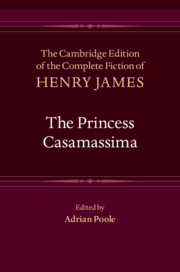Book contents
- Frontmatter
- Contents
- List of Illustrations
- Acknowledgements
- List of Abbreviations
- General Editors’ Preface
- General Chronology of James’s Life and Writings
- Introduction
- Textual Introduction
- Chronology of Composition and Production
- Bibliography
- The Princess Casamassima
- Glossary of Foreign Words and Phrases
- Notes
- Textual Variants I: Substantive Variants up to Copy Text
- Textual Variants II: Substantive Variants after Copy Text
- Emendations
- Appendix: Preface to New York Edition
VI
Published online by Cambridge University Press: 11 April 2021
- Frontmatter
- Contents
- List of Illustrations
- Acknowledgements
- List of Abbreviations
- General Editors’ Preface
- General Chronology of James’s Life and Writings
- Introduction
- Textual Introduction
- Chronology of Composition and Production
- Bibliography
- The Princess Casamassima
- Glossary of Foreign Words and Phrases
- Notes
- Textual Variants I: Substantive Variants up to Copy Text
- Textual Variants II: Substantive Variants after Copy Text
- Emendations
- Appendix: Preface to New York Edition
Summary
One day, shortly after this, at the bindery, his friend Poupin was absent, and sent no explanation, as was customary in case of illness or domestic accident. There were two or three men employed in the place whose non-appearance, usually following close upon pay-day, was better unexplained, and was an implication of moral feebleness; but as a general thing Mr. Crookenden's establishment was a haunt of punctuality and sobriety. Least of all had Eustache Poupin been in the habit of asking for a margin. Hyacinth knew how little indulgence he had ever craved, and this was part of his admiration for the extraordinary Frenchman, an ardent stoic, a cold conspirator and an exquisite artist, who was by far the most interesting person in the ranks of his acquaintance and whose conversation, in the workshop, helped him sometimes to forget the smell of leather and glue. His conversation! Hyacinth had had plenty of that, and had endeared himself to the passionate refugee — Poupin had come to England after the Commune of 1871, to escape the reprisals of the government of M. Thiers, and had remained there in spite of amnesties and rehabilitations — by the solemnity and candour of his attention. He was a Republican of the old-fashioned sort, of the note of 1848, humanitary and idealistic, infinitely addicted to fraternity and equality, and inexhaustibly surprised and exasperated at finding so little enthusiasm for them in the land of his exile. Poupin had a high claim upon Hyacinth's esteem and gratitude, for he had been his godfather, his protector at the bindery. When Anastasius Vetch found something for Miss Pynsent's protégé to do, it was through the Frenchman, with whom he had accidentally formed an acquaintance, that he found it.
When the boy was about fifteen years of age Mr. Vetch made him a present of the essays of Lord Bacon, and the purchase of this volume had important consequences for Hyacinth. Anastasius Vetch was a poor man, and the luxury of giving was for the most part denied him; but when once in a way he tasted it he liked the sensation to be pure.
- Type
- Chapter
- Information
- The Princess Casamassima , pp. 57 - 63Publisher: Cambridge University PressPrint publication year: 2020



